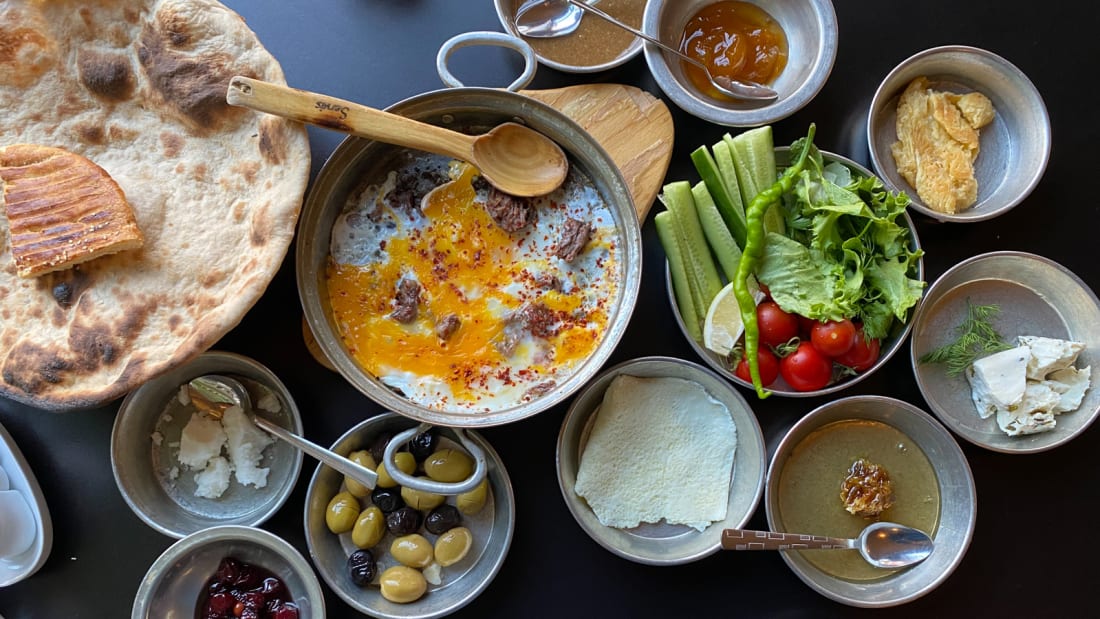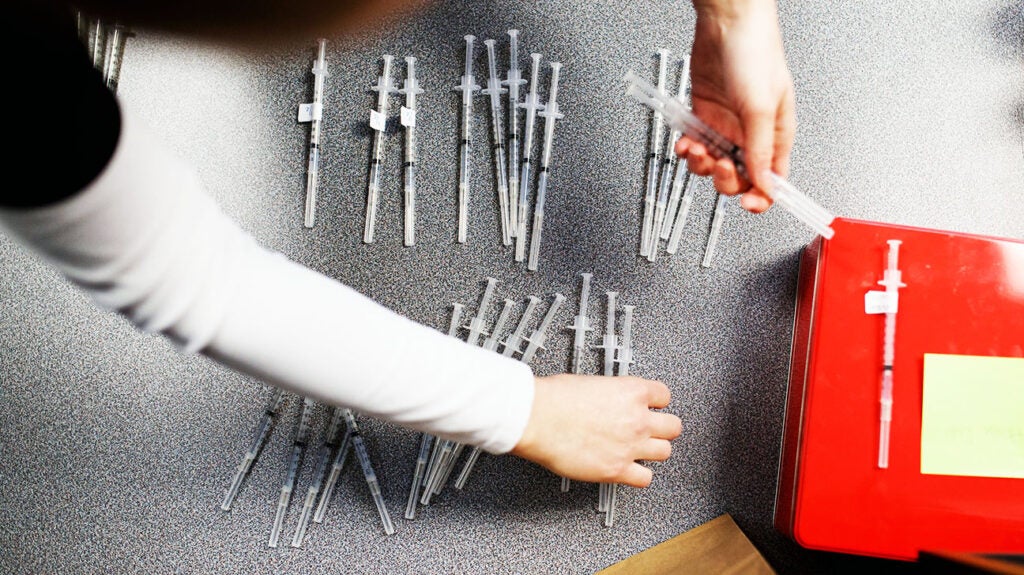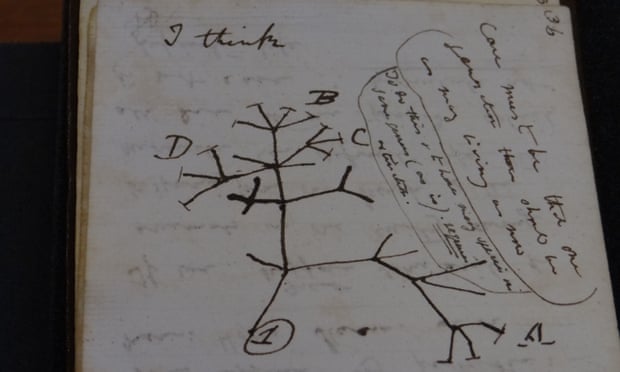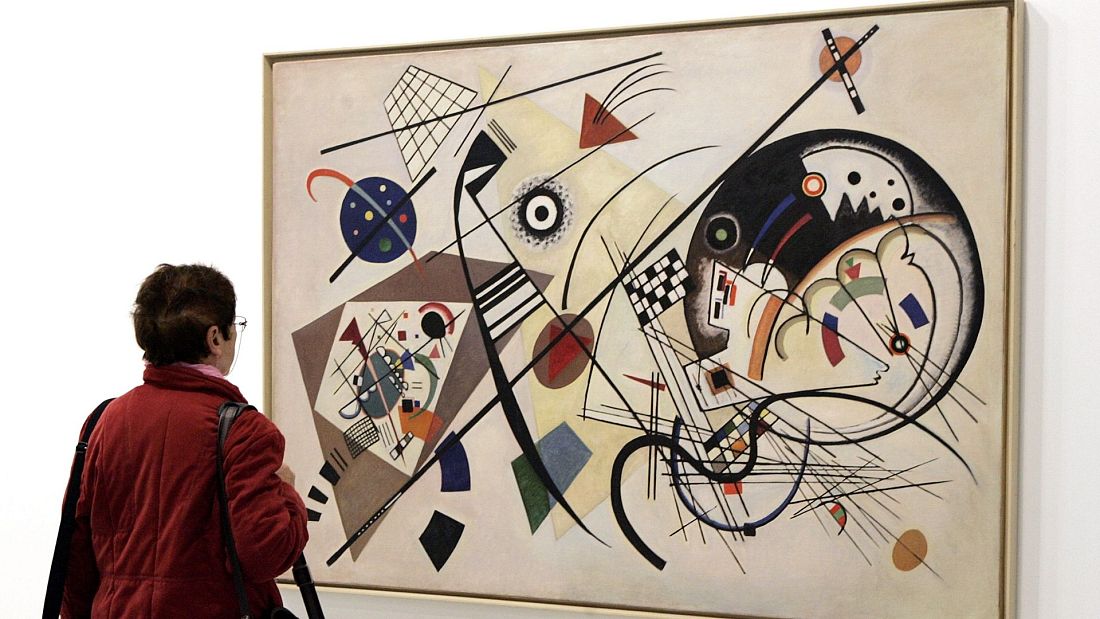Why this city is the world capital of breakfasts?
為何這座城市是全球早餐之都?
Culture
Hours before the sun rises over Van, a city in the far east of Turkey fringed by rolling hillsides and a spectacular lake, preparations are already well underway for the most important meal of the day. By 5 a.m., the scent of oven-hot flatbreads and freshly brewed Turkish tea is wafting across Kahvaltıcılar Çarşısı -- Van's famous so-called "Breakfast Street" -- as dozens of traders open for business to serve up the region's ritual morning feast. Over the course of each day, thousands will pass through this cobbled pedestrian street thought to be Ground Zero for the world's capital of breakfasts. While Turkey is famed for its breakfasts, Van’s serpme kahvaltı is the most epic breakfast of it all. These morning banquets can contain up to 30 different dishes, and they often have a heavy emphasis on the prized dairy produce from livestock that graze on the surrounding Anatolian plateaus. --from CNN News
在凡城拂曉前,一座位於土耳其東方之外、被波狀丘陵及壯麗湖泊所環繞的城市,已為了一天中最重要的一餐展開準備工作。凌晨五點,熱騰騰的扁麵包及現泡土耳其茶的香味正飄盪在Kahvaltıcılar Çarşısı—凡城最著名的「早餐街」,許多攤商正開店供應此地區例行性的早晨盛宴。每天都有數千人行經這被視為是全球早餐之都發源地的鵝卵石布步道。 土耳其因其早餐而聞名,凡城的「開展式早餐」(serpme kahvaltı) 則是其中之最。晨間宴席可能包含多至30幾道菜餚,而它們常特別注重自安納托力亞高原放牧的牲畜產出的珍貴乳製品。 --摘錄翻譯自CNN News
FDA Advisory Group Plans Future Responses to COVID-19
美國食品暨藥物管理局(FDA)諮詢小組規劃對COVID-19未來的因應
Health
In the press release announced by the United States Food and Drug Administration (FDA), Peter Marks, M.D., Ph.D., director of the FDA’s Center for Biologics Evaluation and Research, says: “Now is the time to discuss the need for future boosters as we aim to move forward safely, with COVID-19 becoming a virus like others such as influenza that we prepare for, protect against, and treat.” Dr. Schaffner said “that half the population who is eligible has not yet received their third dose. So, the notion is we ought to be focusing on getting the third dose to people rather than creating more confusion with the fourth dose.” The data in the U.S. would indicate that if you’ve been vaccinated with three doses, that protection against serious disease is maintaining itself pretty well.” --from Medical News Today
美國食品暨藥物管理局(FDA)於媒體公佈,生物製藥評估暨研究中心主任-醫學博士Peter Marker說:「我們要以安全地前進為目標,隨著COVID-19逐漸變得如同我們向來所面對、防禦和治療的流感病毒,現在該是討論未來加強劑需求的時候了。」 醫學博士Schaffner說:「有一半符合條件的人還沒有接種過第三劑,因此,我們的想法是應該專注在讓人們接種第三劑,而不是以第四劑為題,引發更多混亂。」美國的數據顯示,如果你接種了三劑疫苗,對重症便能妥善地維持防禦力。 --摘錄翻譯自Medical News Today
Stolen Darwin Journals Returned to Cambridge University Library
被竊的達爾文日誌已送還劍橋大學圖書館
Sciences
In 2001, two Charles Darwin manuscripts, which represent some of Darwin’s first inklings of his radical theory of evolution by natural selection, were originally found to be missing. They had been removed from storage to be photographed, and work was recorded as completed in November 2000. But during a subsequent routine check made in January 2001, it was found they had not been returned to their proper place. At the time staff believed they may have been mis-shelved. A fingertip search of key areas in the library, which houses about 10m books, maps, manuscripts and other items, proved to be unfruitful, and the books were eventually reported as stolen to the Cambridge constabulary in 2020. Now, in a peculiar twist, the notebooks have been anonymously returned in a pink gift bag, with a typed note on an envelope wishing a happy Easter to the librarian. --from The Guardian
達爾文描繪對天擇進化根本理論的一些初步想法的兩份手稿於2001年被發現遺失了。它們從倉庫中被取出拍照,攝影工作在2000年11月完成;但隨後於2001年1月的例行檢查中,發現它們未被放回適當位置。當時工作人員認為它們可能被誤置於某處。在對館藏約一千萬本書、地圖、手稿和其他物品的圖書館重點區域進行搜索未果後,館方終於在2020年向劍橋警隊報案這些筆記遭竊。現在,離奇地,這些筆記本被裝在附有「祝圖書館員復活節快樂」便條的粉紅色禮品袋中匿名歸還。 --摘錄翻譯自The Guardian
Seoul museum refuses to return Russian artworks in response to Ukraine war
首爾博物館拒絕歸還俄羅斯藝術品做為對烏克蘭戰爭的回應
Culture
The Sejong Center For Performance Arts in Seoul is not returning 75 works it has loaned from four different Russian museums. The pieces were on loan for the exhibition “Kandinsky, Malevich and the Russian Avant-Garde” that was due to run until April 17. But an official for the Yekaterinburg Museum requested the early closure of the exhibition by April 3 due to the “difficult political situation”, reports The Korea Times. The request is in response to the continuing global tension over the Russian invasion of Ukraine. South Korea has joined many other countries in condemning Russia’s war on Ukraine and has approved sanctions against the Russian state. The exhibition, co-run by the Korea Times and Hankook Ilbo will continue for its originally planned duration, claims Hankook Ilbo. “We will adhere to the contract and run the exhibition until the promised date.” --from Euronews
首爾的世宗文化藝術會館拒絕歸還向俄羅斯四間博物館借出的75件展覽品。 韓國時報報導:「這些作品是為了展期至4月17日的『Kandinsky, Malevich and the Russian Avant-Garde』展覽而借用。但是『由於艱難的政治局勢』,Yekaterinburg博物館的一位官員要求展覽提前到4月3日結束。」 這項要求是為響應全球持續對俄國侵略烏克蘭的施壓。南韓與其他許多國家一起譴責俄羅斯對烏克蘭的戰爭,且批准對俄國進行制裁。 韓國日報表示:「這場由韓國時報和韓國日報共同舉辦的展覽將會維持原本規劃的展期,我們會忠於合約展覽至原訂日期。」 --摘錄翻譯自Euronews
Does Cutting Back on Salt Help Folks Battling Heart Failure?
減少鹽分有助於人們對抗心臟衰竭嗎?
Health
Patients with heart failure have been told for years to reduce the salt in their diet as a way to help prolong life, but among more than 800 patients from six countries, reducing salt intake didn't prevent deaths, visits to the emergency room or hospitalizations, the researchers found. Dr. Gregg Fonarow, interim chief of the division of cardiology at University of California, Los Angeles, said that “while more recent guidelines for heart failure have acknowledged the uncertainty about the benefits of reducing salt, many patients have still been told to reduce their salt to very low levels.” --from U.S. News
多年來,心臟衰竭患者一直被告知減少飲食中的鹽分,以幫助延長生命,但在來自六個國家的800多名患者中,研究人員發現,減少鹽攝取量並不能預防死亡、急診室就診數或住院治療。 加州大學洛杉磯分校心臟病學科代理主任Gregg Fonarow博士說,儘管最近的心臟衰竭準則已承認低鹽份攝取量並無確定性影響,但許多患者仍被告知要將鹽分攝取量減低至極低。 --摘錄翻譯自U.S.News
‘It’s a Thorny Issue.’ Why a fight over DNA Data Imperils a Global Conservation Pact
一個棘手的議題-為何爭奪DNA數據會危及全球保育協定
Sciences
For conservation biologists, the highest item on the global agenda this year is persuading the world’s nations to agree on new targets for saving nature. National leaders are scheduled to meet in China later this year to finalize a new strategic plan for the Convention on Biological Diversity (CBD), a 30-year-old global pact that sets decadal goals for preserving species and ecosystems. However, negotiators in Geneva reached an impasse lately. A major stumbling block is how the world should share billions of bits of genetic data stored on computers around the world. For insight into the issue, Science Insider spoke with Amber Hartman Scholz, a microbiologist and head of the science policy group at the Leibniz Institute DSMZ-German Collection of Microorganisms and Cell Cultures GmbH. Scholz, who attended the recent Geneva talks. --from Science News
對保育生物學家來說,今年全球議題的最重要項目是說服世界各國對拯救自然的新目標達成共識。各國領導人稍後將在中國舉行會議,以敲定《生物多樣性公約》(CBD)的新策略計畫,這個已實施30年的全球公約為保護物種和生態系統設定十年為期的目標。然而,不久前在日內瓦的談判陷入僵局。主要癥結是世界應如何共享儲存於世界各地電腦裡的數十億筆基因數據。為深入了解問題,Science Insider採訪了最近參加日內瓦會談的DSMZ- German Collection of Microorganisms and Cell Cultures GmbH的微生物學家兼科學政策小組負責人Amber Hartman Scholz。 --摘錄翻譯自Science News
